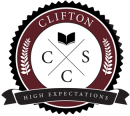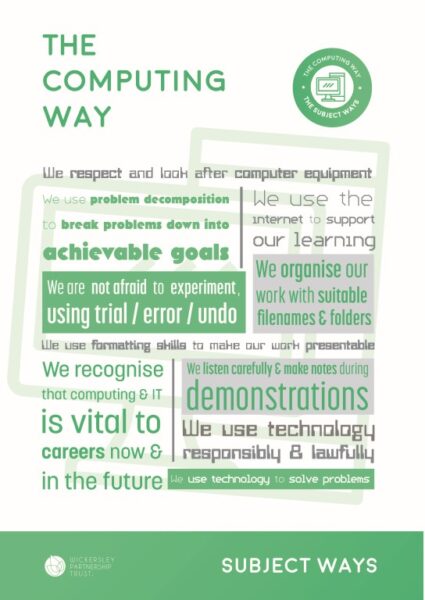Curriculum
Computer Science
The Subject Way
Firstly, to teach students the vital skills they need to achieve their full potential and gain the very best grades they can. Secondly, to teach students how each subject relates to the wider world, incorporating the life skills they will learn.
It is our belief that knowing how what you learn links to the wider world brings a subject to life and therefore improves overall understanding and engagement.
Why study Computer Science?
THIS COURSE PUTS EMPHASIS ON THE UNDERSTANDING OF COMPUTER TECHNOLOGY AND HOW COMPUTER SYSTEMS WORK, IT IS NOT A GAMES DESIGNING COURSE.
This course appeals to students who have an interest in programming in python and how any computer based technology works.
What will I learn about?
Computing is broken down into the following units of work which will be studied in Y9. Lessons will involve a mixture of computer-based and written work.
- Network Topologies and Protocols
- Data Representation (Binary, Denary and Hexidecimal)
- Algorithms including pseudocode/flowcharts
- Practical development of Programming Techniques
As the course continues into Year 10 we will delve into the following units:
- Robust programming – Sanitising and validating program code
- System Softwares – Types of Software and how they work together
- Algorithms – Pseudocode, Flow-Charts and interpreting code
- Wired and Wireless networks – Types of transmission media
- Python Skills – Practical programming skills in a text based language (Python)
- Data Representation – Binary/Hexadecimals
- System Security – Network attacks and preventions
- Legal and Ethical Considerations
- System Architecture – CPU, MDR, MAR, Registers
How will I be assessed?
You will be examined at the end of each module of work, this will be a primarily written assessment with some elements of practical where deemed necessary. At GCSE level this course is assessed through written examinations at the end of Year 11.
What do employers think about the subject?
Computer science is an important subject for people who want to work in the hardware or software development industry.
Additionally, this course provides fundamental skills for any programming or games design career.
What are some of the skills I will gain?
It allows the student to develop an understanding of the fundamentals of computer systems, computer programming and the knowledge and skills suitable for participation in the creation of software applications in ever-evolving computer technology.
This course provides a focus to develop skills whilst ensuring that students acquire a sound knowledge of fundamental concepts around designing and developing software applications either for mobile devices, web enabled environment or simple computer games.
Year-by-Year Subject Breakdown
In Year 7 your child will study:
- Introduction to ICT
- E-safety
- Scratch programming
- Kodu programming
- Image Manipulation in GIMP
- Computing Fundamentals (Hardware, Software, Binary)
Your child’s progress will be assessed using in-class quizzes and tests, summative assessments at the end of each unit of work and a cumulative test at the end of the year, which will test everything they have learnt throughout Year 7.
Typical homework your child might get in Year 7 is:
- Binary/Denary conversions
- Research tasks
- Code annotation
In Year 8 your child will study:
- Text-Based Programming (Python)
- Data Modelling (Spreadsheets)
- Flowol for developing programming skills
- Networks
- Programming with Micro-bits
- App-inventor (Project work)
Your child’s progress will be assessed using in-class quizzes and tests, summative assessments at the end of each unit and a cumulative exam at the end of the year, which will test everything they have learnt throughout Year 8.
Typical homework your child might get in Year 8 is:
- Code annotation
- Research tasks
- Practice test questions
In Year 9 your child will study:
- Flowol/Algorithms
- Python Programming
- Network Security
- Image Manipulation
- Storyboarding and animation/video creation
- System Software
Your child’s progress will be assessed using in-class quizzes and tests, summative assessments at the end of each unit and a cumulative test at the end of the year, which will test everything they have learnt throughout Year 9.
Typical homework your child might get in Year 9 is:
- Pseudocode writing
- Practice test questions
- Completion of unfinished work to meet deadlines
In Year 10 your child will study:
- Computer Components and the inner workings of a computer system (CPU, etc.)
- Memory and Storage
- Wired and Wireless Networks (including topologies)
- System Security – attacks and preventions
- Ethical, legal and cultural concerns
- Programming Skills to complete a project
Your child’s progress will be assessed using in-class quizzes and tests, summative assessments at the end of each unit and a mock exam at the end of the year, which will test everything they have learnt throughout Year 10.
Typical homework your child might get in Year 10 is:
- Practice exam questions
- Revision
- Code Debugging
In Year 11 your child will study:
- Algorithms
- Programming Techniques
- Robust Programming
- Computational Logic
- Translators and facilities of languages
- Data Representations
Your child’s progress will be assessed using in-class quizzes and tests, summative assessments at the end of each unit and mock exams at two set points during the year, which will test everything they have learnt throughout Year 10 and 11.
Typical homework your child might get in Year 11 is:
- Revision
- Exam questions
- Flowchart/Pseudocode writing
Find out more
If you would like more information about our curriculum, please contact Mrs Smith, Headteacher using the details on our contact page.




